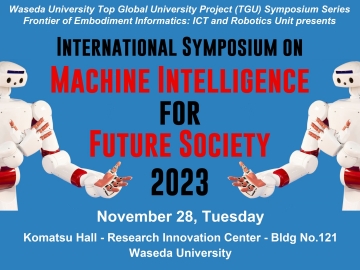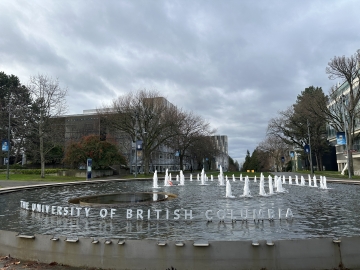Symposium in Memoriam of 70 Years Since the Death of Kan’ichi Asakawa
“Kan’ichi Asakawa: The Building of the Humanities and His Legacy”
Sponsored by: Program for Strategic Research Foundation at Private Universities “The Humanities in Modern Japan and the Asian Cultural Sphere: Crisis and Revitalization in East Asian Humanities”
Co-sponsored by: Waseda University’s Global Japanese Studies Model Unit, Top Global University Project, Waseda University Research Institute for Letters, Arts and Sciences and the Ryusaku Tsunoda Center of Japanese Culture
Support by: Seminar on Kan’ichi Asakawa, the Asakawa Peace Association, Fukushima-Minpo Co., Ltd.
Dates and times: July 21, 2018 (Sat.) 1:30 pm to 5:20 pm and July 22, 2018 (Sun.) 10:00 am to 4:30 pm
Venue: Okuma Auditorium, Waseda University
Program:
Opening remarks Sung-si Lee (Professor, Waseda University)
Explanation of purpose Takashi Jinno (Professor, Waseda University)
Part 1: Kan’ichi Asakawa as a Historian 1:50 pm to 5:20 pm
Moderator Shutaro Muto (Associate Professor, Niigata University)
Report 1. Shigekazu Kondo (Professor, The Open University of Japan)
“Kan’ichi Asakawa’s Studies of the History of Medieval Southern Kyushu”
Report 2. Takashi Jinno
“Kan’ichi Asakawa’s Historical Research from the 1930s Onward”
Report 3. Tadashi Ebisawa (Professor, Waseda University)
“115 Years After A Study of the Taika Reforms”
Report 4. Toyomi Asano (Professor, Waseda University)
“Kan’ichi Asakawa’s Studies of Legal History and the Origins of the Symbolic Emperor System”
Discussion
Part 2: Kan’ichi Asakawa’s East Asian Studies, 10:00 am to 12:40 pm
Moderator Tadashi Ebisawa
Report 1. Yukimi Masui (Professor, Keiai University)
“William J. Tucker’s University Reforms and the Role of Kan’ichi Asakawa”
Report 2. Yumiko Tomita-Matsutani (Librarian, Seisen University Library)
“Kan’ichi Asakawa and the Japan Library Association
Report 3. Shutaro Muto (Associate Professor, Niigata University)
“Kan’ichi Asakawa and Modern China”
Discussion
Part 3: Kan’ichi Asakawa and Advocacy for World Peace, 1:40 pm to 4:20 pm
Moderator Michio Yamaoka (Professor, Waseda University)
Report 1. Haruko Yamauchi (Director, Seminar on Kan’ichi Asakawa)
“Kan’ichi Asakawa’s Post-War Plan ‘Democracy’ and the Role of an Open Letter”
Report 2. Bo Tao (Graduate Student, Yale University)
“Sociology and Social Evangelism: The Institute of Pacific Relations and the Progressive Concerns of a Protestant Missionary Network”
Report 3. Haruko Nakamura (Research Librarian, Yale University East Asia Library)
“Kan’ichi Asakawa and the International Auxiliary Language Association”
Discussion
Closing statement Tadashi Ebisawa
Overview of the Event:
Kan’ichi Asakawa, a Yale University professor, is known as a researcher who compared the feudal systems in medieval Japan and Europe. He also built the foundations for Japanese studies at Yale by taking on the responsibility of purchasing East Asian texts for the institution. Additionally, he levied various criticisms against the rise of Japanese militarism from the Russo-Japanese War through World War II in his written works and letters. Asakawa was engaged in a wide range of activities, but upon reading his works and letters one can see him integrating academic knowledge from Japan and the West and striving to create a universal humanities transcending East and West. In this symposium, the intention was to consider the ideals concerning knowledge that Asakawa aimed to achieve and thereby to gain an outlook on the future of the humanities at which we should be aiming.
*******************************************
In memoriam of 70 years since the death of Kan’ichi Asakawa, the symposium “Kan’ichi Asakawa: The Building of the Humanities and His Legacy” was held over the course of two days in Okuma Auditorium. Kan’ichi Asakawa was the first Japanese national to become a Yale professor, and he was the person who built the foundation for Japanese studies at the university. Kan’ichi Asakawa was born in the city of Nihonmatsu, Fukushima Prefecture. The symposium was attended by many, including members from Fukushima Kenjinkai and the Fukushima-based Asakawa Peace Association. The total number of attendees during the two days was 300.
At the start of the symposium, Professor Lee Sung-si, a director at Waseda University, introduced the audience to Kan’ichi Asakawa and discussed matters such as his involvement with Ryusaku Tsunoda, who graduated from Tokyo Senmon Gakko (now Waseda University), as did Asakawa, before lecturing at Columbia University. Professor Lee also explained that he considered this symposium on Kan’ichi Asakawa—who had profound knowledge of the humanities of the East and West—an opportunity to consider the crisis in, and the revitalization of, the humanities in East Asia.
Next, Waseda University Professor Takashi Jinno explained the purpose of the event, stating that various aspects of Asakawa would be spotlighted for discussion throughout the symposium. Specifically, the aspects to be considered were: in Part 1, Asakawa as a historian; in Part 2, Asakawa as the builder of the foundations for Japanese studies in the US; and, in Part 3, Asakawa as a pacifist. Professor Lee argued, however, that all three of these areas were organically linked with one another through Asakawa’s profound insights as a historian and that revealing these interconnections was the main goal of the symposium. Then, after a detailed description of the life of Kan’ichi Asakawa, the microphone was handed over to the moderator for Part 1, Associate Professor Shutaro Muto.
At the beginning of Part 1, the moderator, Associate Professor Shutaro Muto, related Kan’ichi Asakawa’s body of research as a historian, focusing on his studies of the Taika Reforms and the Iriki documents. Asakawa left numerous unpublished research documents, the Asakawa Papers, to Yale University, and in Part 1, most of the explications aimed to shed light on the overall picture of Asakawa as a historian based on these unpublished papers. After Muto’s explanation of the purpose of this Part, there were presentations by scholars: “Kan’ichi Asakawa’s Studies of the History of Medieval Southern Kyushu” by Professor Shigekazu Kondo, “Kan’ichi Asakawa’s Historical Research from the 1930s Onward” by Professor Takashi Jinno, “115 Years After A Study of the Taika Reforms” by Professor Tadashi Ebisawa, and “Kan’ichi Asakawa’s Studies of Legal History and the Origins of the Symbolic Emperor System” by Professor Toyomi Asano. Afterward, the discussion consisted of dialogs among the presenters about their presentations, how they related to one another, and other matters before questions were taken from the audience.
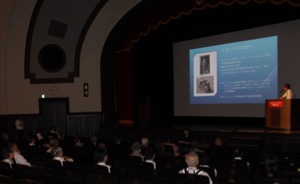
On the second day, report presentations and discussions were conducted in Parts 2 and 3 of the symposium. Part 2 began with the moderator, Tadashi Ebisawa, explaining its purpose. Asakawa often analyzed matters relating to China and appears to have gained a strong interest in the country based, in particular, on the events surrounding the Boxer Rebellion. That time was a period of tumult for East Asia, and this could be described as a tense subject to touch upon. Nonetheless, the presenters each gave detailed reports relating to how Asakawa was involved with East Asia during this period: “William J. Tucker’s University Reforms and the Role of Kan’ichi Asakawa” by Professor Yukimi Masui, “Kan’ichi Asakawa and the Japan Library Association” by Ms. Yumiko Tomita-Matsutani, and “Kan’ichi Asakawa and Modern China” by Associate Professor Shutaro Muto. Afterward, Professor Masui added depth to the discourse in the discussion section by presenting several keywords, including “cosmopolitan,” and then answered questions from the audience.
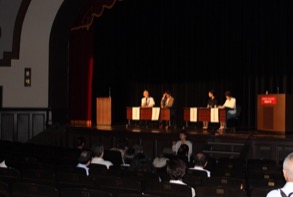
Next, in Part 3, the moderator, Professor Michio Yamaoka, explained the purpose of the final Part while describing the history of the Seminar on Kan’ichi Asakawa. The scholars for this Part presented the following reports: “Kan’ichi Asakawa’s Post-War Plan ‘Democracy’ and the Role of an Open Letter” by Ms. Haruko Yamauchi, “Sociology and Social Evangelism: The Institute of Pacific Relations and the Progressive Concerns of a Protestant Missionary Network” by Mr. Bo Tao, and “Kan’ichi Asakawa and the International Auxiliary Language Association” by Ms. Haruko Nakamura. Afterward, in the discussion, the moderator asked each presenter questions, leading to a detailed dialogue on matters such as Asakawa’s background as a pacifist, and then questions were taken from the audience.
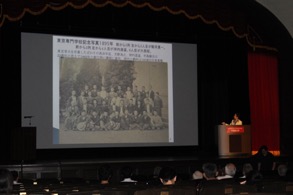
Thus, Part 3 concluded, and Professor Tadashi Ebisawa used his closing remarks to provide an overview of what was discussed in Parts 1 through 3 and to present an outlook on future research. The two-day symposium then drew to a successful close. The proceedings of the symposium are scheduled to be published in February 2019 by Yoshikawa Kobunkan under the tentative title Kan’ichi Asakawa: The Building of the Humanities and His Legacy.

